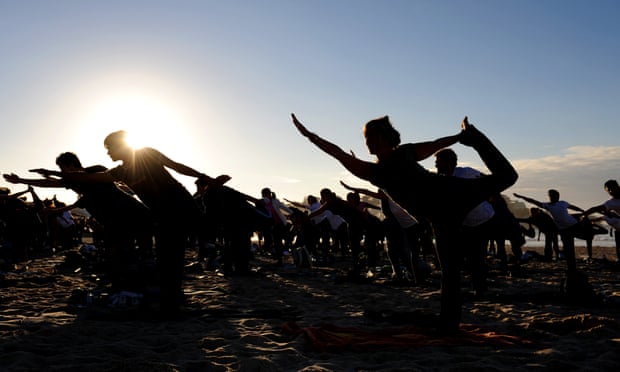
You see them everywhere around Bondi – risking a nosebleed during downward dog, loading up on green juice to detox from the weekend, the plunge into the sea to shake off the hangover, the coconut water to replenish the electrolytes depleted in the club.
They’re cocaine users with wellness problems. And their natural habitat is the eastern suburbs of Sydney, where they spend their days at yoga studios and on the beach and their nights chained to the mirror and the razor blade.
As the Bondi Hipsters put it:
Have you got anything gluten free?
I’m no coeliac, but it disagrees with me
Mmmm, and I don’t like toxins either.
Should I cleanse my liver with a ginger tea?
Getting ready. Night in the city
Order a bag and some disco biccies
Shooting up bath salts. That was ace!
Does anyone feel like eating their own face?!
Let’s call this phenomenon the “Bondi paradox”.
It’s former Olympic swimmer Geoff Huegill in last week’s Daily Telegraph announcing that, after serving a six-month good behaviour bond for cocaine possession, he and his publicist wife are starting a health and wellness business.
It’s getting hauled out of your house by police during a massive Bondi drug bust while looking pristine in your activewear.
And it’s Lisa Stickbridge, an eastern suburbs blogger and convicted cocaine trafficker, who at a hearing complained about the conditions in prison.
According to the Daily Telegraph, “the self-styled lifestyle blogger also said prison food made her hair fall out, gave her migraines and mood swings all brought on by her many dietary intolerances”.
“I have issues with sugar, wheat, dairy, yeast, anything that is processed,” Stickbridge told the Tele.
Bondi sells Australia wellness, with products ranging from cold-pressed juices to organic soaps apparently borrowing some of its magic. It also sells Sydney its nightlife. We laugh, but the Bondi paradox is not necessarily hypocritical. The bacchanalian way of life – letting loose before knuckling back down – has been a way of life since the days of Greek god Dionysus.
“[T]o join in dances, to laugh with the flute, and to bring an end to cares, whenever the delight of the grape comes at the feasts of the gods,” is the bacchanalian way, Euripides wrote. In losing control, followers lost their self-consciousness and cares in brief, intense frenzies before returning to their highly ordered lives.
The bacchanalia had a dark undertone of violence and sexuality. But the enjoyment of purity that forms the impossible, ghastly ideal of the wellness industry is more stoic.
You eat clean, you avoid poisons like sugar, you aspire to living according to natural rhythms, for fun.
You rise with the sun and enjoy early nights, you regularly detox your organs, forfun.
You do your yoga-teacher training for fun, you run the City2Surf every year forfun, hours of your weekend slip by as you drift on your paddleboard, toning your abs, for fun. You live like this all the time (except when you’re out).
The $20 green breakfast bowls, the $10 charcoal juices, the lemon detox kits and the monastic levels of denial: what the wellness gurus don’t tell you is that it’s all massively dull, expensive and unnatural to embrace the precepts of the wellness industry to their ends. Nor does it do what self-denial is meant to: help you achieve moral or spiritual insights.
Is that what the coke is for? To transcend the regimented life of fitspiration? Or is it the other way around, with wellness being the higher state of being than the grind of drugs and partying?
Maybe those living the Bondi paradox don’t even know. Only in the unhealthy all-or-nothing standards set by the wellness industry does the paradox even make sense.
[“source-theguardian”]